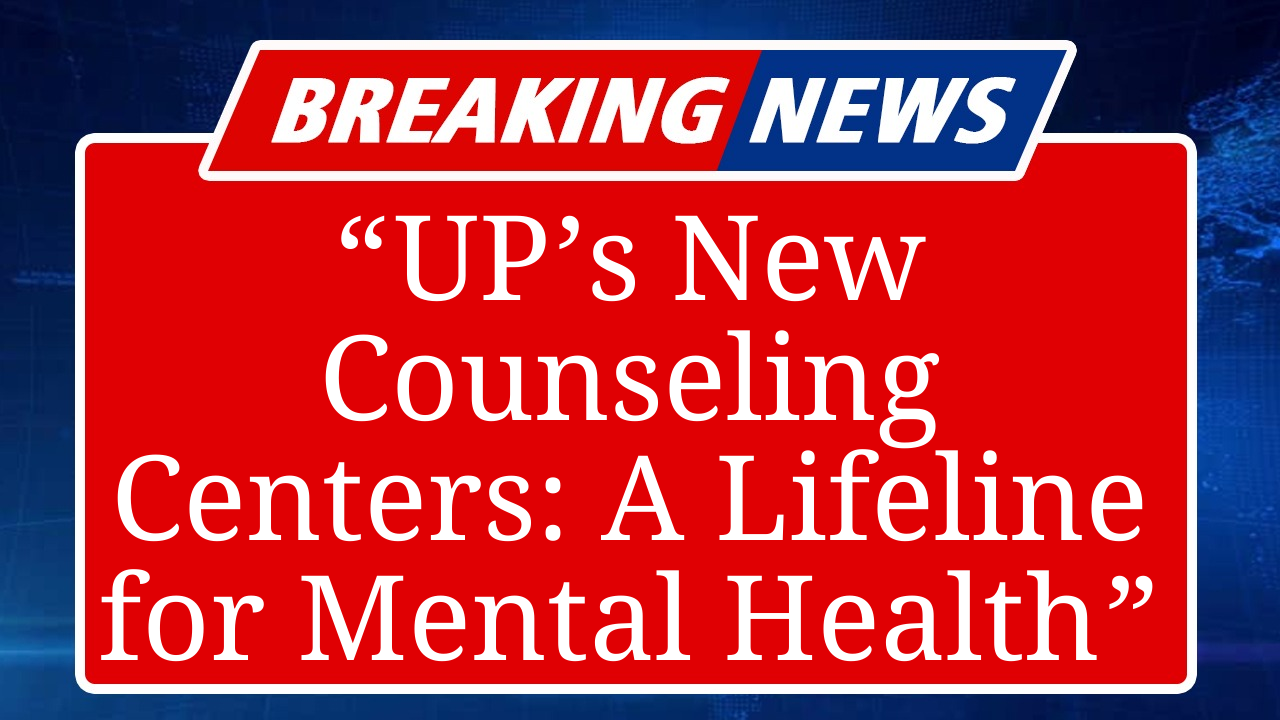“Uttar Pradesh is expanding mental health services with new counseling centers across districts, aiming to address rising mental health issues. Backed by government initiatives, these centers offer free therapy and crisis support, targeting youth and rural communities. The move aligns with national efforts to reduce stigma and improve access to care, tackling India’s significant mental health treatment gap.”
Uttar Pradesh Enhances Mental Health Infrastructure with Counseling Centers
In a significant step toward addressing the growing mental health crisis, Uttar Pradesh has launched a series of new counseling centers across its districts, aiming to provide accessible and affordable mental health support to its diverse population. This initiative, spearheaded by the state government in collaboration with the National Mental Health Programme (NMHP), responds to the alarming statistic that an estimated 197.3 million Indians suffer from mental disorders, with a vast majority lacking access to adequate care.
The counseling centers are strategically located in both urban and rural areas, ensuring inclusivity for underserved communities. These facilities offer free and low-cost services, including individual therapy, group counseling, and crisis intervention, with a focus on conditions like anxiety, depression, and stress-related disorders. Trained psychologists and counselors, many registered with the Rehabilitation Council of India (RCI), staff these centers, providing evidence-based interventions such as Cognitive Behavioral Therapy (CBT) and psychoeducation.
The initiative aligns with the broader goals of the NMHP, launched in 1982, and the District Mental Health Programme (DMHP), which has expanded to 716 districts nationwide. Uttar Pradesh’s efforts are further supported by the integration of mental health services into primary healthcare systems under the Ayushman Bharat scheme, which has upgraded over 1.73 lakh health centers to include basic counseling and psychiatric medication. This integration aims to reduce the dependency on specialized hospitals and make mental health care community-centric.
A key focus of these centers is addressing the mental health needs of the youth, who face increasing pressures from academic stress, unemployment, and social media influences. For instance, centers in cities like Lucknow and Kanpur have introduced programs tailored for students, including workshops on stress management and career counseling. Rural areas, often neglected in mental health discourse, are also prioritized, with mobile-based interventions and awareness campaigns to combat stigma.
The state has also integrated the Tele MANAS helpline, a national initiative launched in 2022, into its framework. As of February 2025, Tele MANAS has handled over 1.81 million calls, offering immediate tele-counseling and referrals to psychiatrists for severe cases. Uttar Pradesh’s 53 Tele MANAS cells ensure localized support, with services available in regional languages like Hindi and Bhojpuri to enhance accessibility. The recently launched Tele MANAS app further provides self-care strategies and direct access to professionals, making it a vital tool for remote areas.
Despite these advancements, challenges remain. Primary health centers are often overburdened, with limited staff and resources, which hinders the seamless integration of mental health services. Additionally, societal stigma continues to deter many from seeking help, particularly in rural regions where traditional healers are often preferred over professional care. Studies indicate that 32.8% of patients with bipolar disorder in North India first approach faith healers, highlighting the need for sustained awareness efforts.
The Uttar Pradesh government has allocated significant funds under the National Health Mission, with Rs. 159.75 crore dedicated to the DMHP for 2022-23, to strengthen infrastructure and train healthcare workers. Collaborations with platforms like iGOT-Diksha are also equipping general physicians and community health volunteers with skills to diagnose and manage mental health conditions, fostering early intervention.
Non-governmental organizations are playing a complementary role. For example, initiatives like the Vandrevala Foundation’s 24/7 helpline (+919999666555) provide free counseling, while NGOs like Sangath train lay counselors to bridge the treatment gap in community settings. These partnerships are crucial in a state as populous as Uttar Pradesh, where the demand for mental health services far exceeds the supply of trained professionals.
The state’s efforts also reflect a broader national shift toward recognizing mental health as a public health priority. The Mental Healthcare Act of 2017 and the Rights of Persons with Disabilities Act of 2016 have laid a legal framework to protect those with mental illnesses, ensuring their right to dignified care. Uttar Pradesh’s new centers are a testament to this evolving landscape, aiming to create a more inclusive and empathetic approach to mental well-being.
Disclaimer: This article is based on recent reports and publicly available information from government sources, NGOs, and mental health organizations. Data is sourced from credible platforms, including the Ministry of Health and Family Welfare, WHO estimates, and established mental health service providers. The information is intended for awareness and does not constitute medical advice. Always consult a certified professional for mental health concerns.

